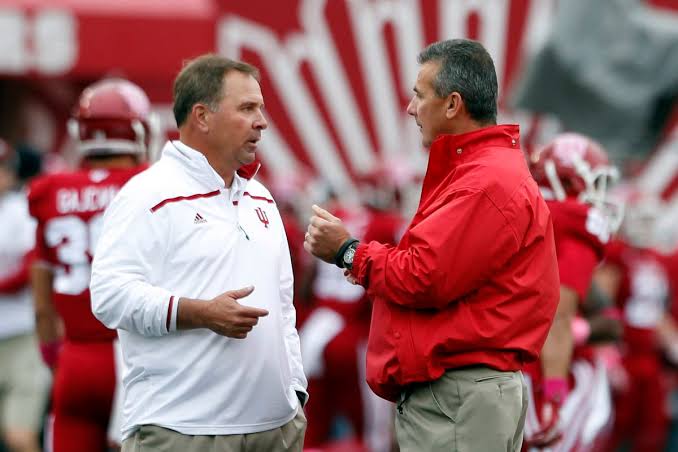Indiana University officials conducted two investigations into former football coach Kevin Wilson’s treatment of injured players, according to a report from the Indianapolis Star on Saturday.

Wilson, who resigned as Hoosiers coach Thursday over what athletic director Fred Glass called “philosophical differences,” was initially questioned about his treatment of injured players in April 2015, according to the report. In April 2015, Glass hired an outside law firm to conduct the inquiry, and he did so again in the past four to six weeks, sources familiar with the second investigation told ESPN.
According to the Star report Saturday, the initial investigation was prompted by complaints about the IU football program’s treatment of former lineman Nick Carovillano, who played for the Hoosiers in 2014. On April 8, 2015, Carovillano’s father, Dean, contacted IU associate athletic director Anthony Thompson to make a complaint on his son’s behalf. Six days later, according to the Star, IU retained a law firm to investigate the allegations.
Dean Carovillano told ESPN on Saturday that his son suffered a back injury in practice in September 2014. When Nick Carovillano asked an Indiana trainer to examine his back, the trainer asked him if he had numbness in his legs. According to his father, when Carovillano said he didn’t, the trainer told him, “Then I won’t treat your injury.” A few days later, according to his father, Indiana’s trainers told Carovillano that he was suffering from shin splints and needed to stretch better. But when Carovillano returned home to Cincinnati a few weeks later, his parents noticed he could barely climb out of his car.
That weekend, a doctor noticed Carovillano struggling to walk across the room at a social gathering. The doctor told him he needed to stop playing sports immediately, according to his father. When Carovillano returned to Bloomington after the weekend at home, he told trainers a doctor advised him to stop playing. He was examined by Indiana’s trainers and sent to a specialist in Indianapolis. The specialist diagnosed him with having bone fragments and three injured disks in his back.

“He’d been called every name in the book to keep practicing,” Dean Carovillano said. “He was a 19-year-old kid. He wanted to please his coaches, not be ridiculed, and wanted to make the team.”
After rehabbing his back for six months, Carovillano decided to leave Indiana in April 2015. When his parents drove to Bloomington to help him move out, Wilson and other IU coaches requested a meeting with them. They tried to persuade Carovillano to stay through the end of the semester so the team’s graduation rate wouldn’t decrease, according to his father.
“My son lost everything,” Dean Carovillano said. “He lost his scholarship. He has an injured back, and he was an emotional wreck.”
According to the Star, Glass met with Wilson on April 13, 2015, to discuss the allegations about his mistreatment of injured players. The next day, Glass sent Wilson a memorandum that included a warning: “As you know, IU will not tolerate any behavior among you and your staff that penalizes, ostracizes, or criticizes any injured football player. I trust that you and your staff are abiding by this long-standing policy.”
According to the Star, Glass met with Wilson on April 13, 2015, to discuss the allegations about his mistreatment of injured players. The next day, Glass sent Wilson a memorandum that included a warning: “As you know, IU will not tolerate any behavior among you and your staff that penalizes, ostracizes, or criticizes any injured football player. I trust that you and your staff are abiding by this long-standing policy.”
According to the Star, the law firm Glass hired for the investigation interviewed 20 people and issued a 26-page report on May 1, 2015.

“An outside investigation has concluded that Nick did not receive inadequate medical care, that there is no evidence that the coaching staff exerted improper influence on the medical staff regarding the student-athlete’s medical care,” Glass wrote in a memo to Wilson, which was obtained by the Star. But Glass also wrote, “Even within the unique culture of football, there were behaviors that may create an unhealthy environment for injured players. This last conclusion was based on a variety of findings, including your own admission that you made jokes to injured players or implied that they are not useful members of the team.
“Some players said that they felt pressure or witnessed coaches pressuring others and indicated that they found it depressing and demoralizing to have coaches make such comments when they were already frustrated with their injuries. It was found that coaches appear to push players to work harder than they should when they have injuries that are unconfirmed by an outside test.”
Even after conducting the initial review into Wilson’s conduct, Glass rewarded him with a raise and a six-year contract extension — at $2.55 million per season — through 2021 after he guided the Hoosiers to their first bowl appearance since 2007.
During a news conference in Bloomington, Indiana, on Thursday, Glass said there was “no smoking gun, no precipitating event” that led to his decision to ask for Wilson’s resignation. Glass said he was confident that no players’ medical issues were compromised under Wilson. Instead, Glass said the two “weren’t on the same page” in terms of leadership style.
Carovillano, however, wasn’t the only former Indiana player to complain about Wilson’s treatment of him when injured.
